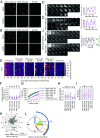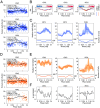Circadian period is compensated for repressor protein turnover rates in single cells
- PMID: 39141353
- PMCID: PMC11348271
- DOI: 10.1073/pnas.2404738121
Circadian period is compensated for repressor protein turnover rates in single cells
Abstract
Most mammalian cells have molecular circadian clocks that generate widespread rhythms in transcript and protein abundance. While circadian clocks are robust to fluctuations in the cellular environment, little is known about the mechanisms by which the circadian period compensates for fluctuating metabolic states. Here, we exploit the heterogeneity of single cells both in circadian period and a metabolic parameter-protein stability-to study their interdependence without the need for genetic manipulation. We generated cells expressing key circadian proteins (CRYPTOCHROME1/2 (CRY1/2) and PERIOD1/2 (PER1/2)) as endogenous fusions with fluorescent proteins and simultaneously monitored circadian rhythms and degradation in thousands of single cells. We found that the circadian period compensates for fluctuations in the turnover rates of circadian repressor proteins and uncovered possible mechanisms using a mathematical model. In addition, the stabilities of the repressor proteins are circadian phase dependent and correlate with the circadian period in a phase-dependent manner, in contrast to the prevailing model.
Keywords: circadian rhythms; fluorescence microscopy; metabolic compensation; protein degradation; single-cell imaging.
Conflict of interest statement
Competing interests statement:The authors declare no competing interest.
Figures






References
-
- Dibner C., Schibler U., Albrecht U., The mammalian circadian timing system: Organization and coordination of central and peripheral clocks. Annu. Rev. Physiol. 72, 517–549 (2010). - PubMed
-
- Welsh D. K., Logothetis D. E., Meister M., Reppert S. M., Individual neurons dissociated from rat suprachiasmatic nucleus express independently phased circadian firing rhythms. Neuron 14, 697–706 (1995). - PubMed
-
- Herzog E. D., Takahashi J. S., Block G. D., Clock controls circadian period in isolated suprachiasmatic nucleus neurons. Nat. Neurosci. 1, 708–713 (1998). - PubMed
MeSH terms
Substances
Grants and funding
LinkOut - more resources
Full Text Sources
Research Materials

